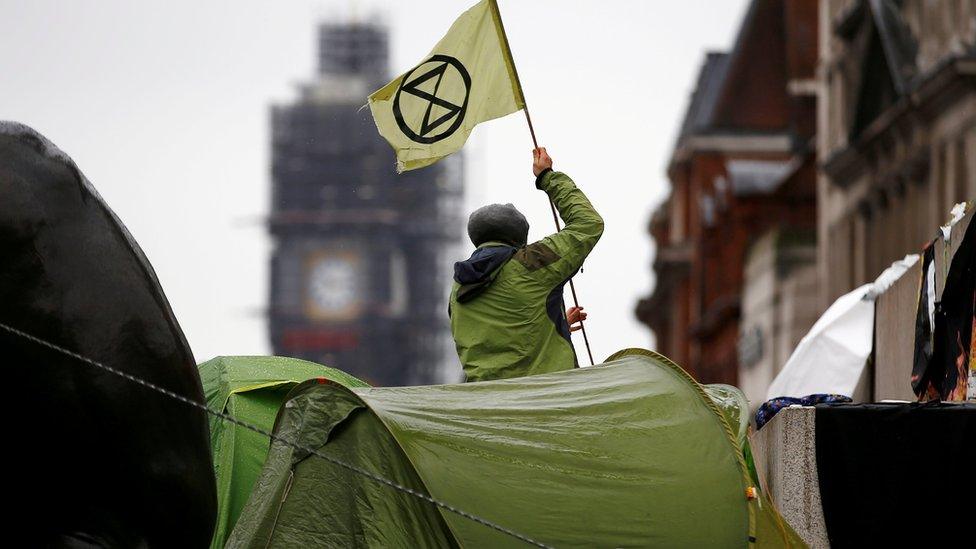Extinction Rebellion: Police defend adding groups to extremism guide
- Published

Police have defended the inclusion of environmental groups such as Extinction Rebellion and Greenpeace in a counter-terrorism guide, saying it was produced to help frontline officers.
The Guardian reported, external that the 24-page police guide was distributed to teachers and medical staff as part of anti-extremism briefings last year.
They appeared next to extremist right-wing groups such as National Action.
Extinction Rebellion warned it could have a "chilling effect" on people.
It comes after counter-terrorism police in south-east England admitted an "error of judgement" earlier this month - after listing Extinction Rebellion as an "extreme ideology" in a 12-page guide.
According to the Guardian, the police document includes other non-violent groups such as ocean pollution campaigners Sea Shepherd, animal rights group Peta and the Campaign for Nuclear Disarmament (CND).
A signs and symbols guide referred to by the paper shows a Nazi swastika in one section and the Extinction Rebellion and Greenpeace symbols in another.
Deputy Assistant Commissioner Dean Haydon, senior national co-ordinator for the UK's Counter Terrorism Policing, said police do not consider legitimate protest groups to be extremist or a threat to national security.
He said the visual aid was produced with the aim of helping police "identify and understand signs and symbols" so they know the difference between them.
In a statement, he said: "The guidance document in question explicitly states that many of the groups included are not of counter-terrorism interest, and that membership of them does not indicate criminality of any kind.
"To suggest anything else is both unhelpful and misleading."
He said the document was used by the government's counter-terrorism strategy, known as the Prevent programme, but "only as a guide to help them [Prevent] identify and understand the range of organisations practitioners might come across".
'Chilling effect'
However, Extinction Rebellion said its inclusion in the document was "nothing short of pointing a finger at anyone that thinks differently to 'business as usual'."
The group said: "The chilling effect is to leave people feeling under scrutiny, watched and pressurised, feeling othered, ashamed or afraid to be open about the things they care about such as the environment and the world around us."
Kate Hudson, general secretary of the Campaign for Nuclear Disarmament, also questioned the group's inclusion in the guide, saying it "threatens our right to political engagement and peaceful protest".
"We have no secrets and act in the public interest," she added.
Greenpeace UK's executive director, John Sauven, said there was "nothing extremist about people from all walks of life taking peaceful, non-violent action to stop climate chaos and ecological collapse".
"Tarring environmental campaigners and terrorist organisations with the same brush is not going to help fight terrorism. It will only harm the reputation of hard-working police officers."